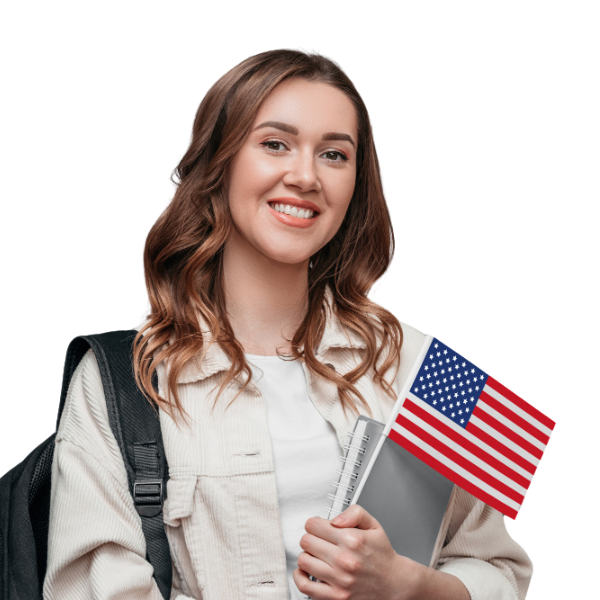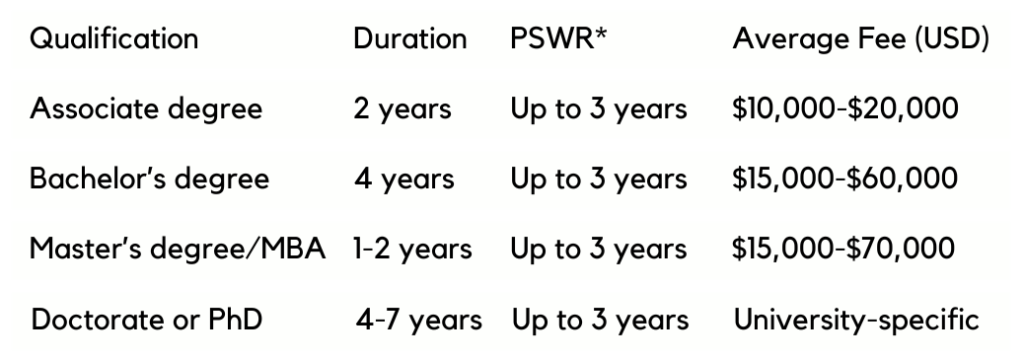Study in USA
We guide you through every step of the abroad education process, acting as your pathfinder.

Top Universities, Courses & Scholarships
Here are the reasons why the United States is the top choice for international students
With abundant footfall, good quality education, renowned universities and amazing job prospects, the US tops the charts! Know why studying in the US is a life-changing experience.
Why study in the US?
Know why the USA is the place to be for higher education:
Globally Ranked Universities: The US is home to some renowned universities. According to the QS World University Rankings 2024, 16 of the top 50 universities in the world are in the US.
Variety of popular courses: US universities have a plethora of courses you can choose from.
Job prospects: The US is not just popular for its Silicon Valley but is also home to a maximum number of Fortune 500 companies.
Research opportunities: US universities have world-class research opportunities and renowned faculties.
Scholarships and financial aid: The US offers the maximum number of scholarships and assistantships.
Programs and their duration in the US
Here are the programs that the US universities offer:

Academic Intake to study in the US
US universities usually have 3 intakes. In some universities, intakes may also be referred to as a semester. The three intakes available in the US are:
Deadline for US universities
You need to start preparing for your US application 8-9 months in advance before the commencement of your program.
Cost of studying in the US
The average cost of studying in the US ranges from $10,000-$75,000 per year while the cost of living ranges from $8,000-20,000 per year.
IELTS score/Standardised test for US universities
IELTS score is accepted widely in US institutions. You might also require taking standardised tests such as:
Act/SAT
GMAT/GRE
Types of part-time and full-time work in the US for international students
The US offers a variety of part-time and full-time work opportunities to international students. Here are the few options you can opt for:
- Curricular Practical Training/Internships
- Assistantships
- Teaching assistantship
- Research assistantship
- Resident assistantship
- Optional practical training

Popular programs to study in the US
It is best to do your research before you apply to any of the universities and shortlist the ones you find the most suitable as per your dreams and aspirations. Here are the popular courses in the US:
- Engineering
- Computer Science
- Physical Health
- Psychology
- Business Management
- Life Science
- Finance
- Economics
Student visa checklist for the US
Be prepared for the following documents before you apply for a Student Visa to study in the US:
- Passport
- 1 20 and offer letter
- Visa appointment letter
- DS-160 confirmation
- SEVIS-Fee receipt and Visa fee receipt
- Finances and scholarship
- 6-month bank statement
- Academic transcripts
- Work experience certificates
- Standardised Test scores
- Internships and other relevant certificates
Frequently Asked Question You Should Know
In general, you must submit an online application, academic transcripts, scores from standardized tests (such as the IELTS, MOI, OIETC, or Duolingo), letters of recommendation, and a statement of purpose. The admission process may differ from university to university.
Choosing to pursue a Master’s in the US can change your life by improving your technical abilities and upgrading your resume. Look for colleges that have a strong emphasis on real-world learning, practical experience, and job preparation. Universities in the US embrace variety and offer a vibrant atmosphere for networking and intercultural understanding. There are many different subjects of study accessible in master’s and doctoral graduate programs in the US. List your undergraduate program interests first, choose your area of interest, and take into consideration language and aptitude tests while applying to universities. Plan accordingly for the course intake of your choice.
The language proficiency criteria for admission to U.S. universities can fluctuate based on the specific institution and the chosen academic program. In general, international students whose native language is not English are typically required to demonstrate their English language skills through standardized assessments. The most commonly recognized English language proficiency examinations include:
IELTS (International English Language Testing System): IELTS is a widely accepted examination for assessing English language proficiency. Many U.S. universities acknowledge this test and consider its results during the admission process.
Duolingo English Test: This is a relatively recent addition, and some universities have started to recognize the Duolingo English Test as an alternative to TOEFL and IELTS for assessing language proficiency.
PTE Academic (Pearson Test of English Academic): Certain universities may also admit PTE Academic scores as evidence of English language proficiency.
Medium Of Instruction (MOI): If a student from Bangladesh pursued their degree in the USA, where English serves as the primary medium of instruction, they may be issued an MOI certificate confirming that their academic program was conducted in English.
- Secure an Acceptance Letter: Begin by obtaining an acceptance letter from a U.S. university or college approved by the Student and Exchange Visitor Program (SEVP). Ensure that the institution provides the required Form I-20 or DS-2019 for your visa application.
- Pay the SEVIS Fee: Upon receiving the Form I-20 or DS-2019, proceed to pay the SEVIS (Student and Exchange Visitor Information System) fee, which can be done online through the SEVIS website.
- Complete the DS-160 Form: Fill out the DS-160 Nonimmigrant Visa Application form online via the U.S. Department of State’s Consular Electronic Application Center. This form is a prerequisite for most nonimmigrant visa applications.
- Schedule Your Visa Interview: Visit the website of the U.S. embassy or consulate in your home country to arrange an appointment for your visa interview. Given the potentially high demand for interviews, it is advisable to book your appointment well in advance.
- Assemble the Necessary Documents: Prepare the essential documents, which may include:
- A valid passport for travel to the USA
- DS-160 confirmation page
- Receipt for the SEVIS fee payment
- Form I-20 or DS-2019
- Passport-sized photographs adhering to specified requirements
- Academic transcripts and standardized test scores
- Documentation demonstrating adequate financial resources for tuition and living expenses
- Proof of connections to your home country (to establish your intent to return after completing your studies)
- Attend the Visa Interview: On the designated date, participate in the visa interview at the U.S. embassy or consulate. Be prepared to answer questions about your educational plans, ties to your home country, and financial capacity. Respond truthfully and confidently during the interview.
- Await Visa Processing: Following the interview, a consular officer will determine whether to approve or decline your visa application. Processing times may vary, so your patience is appreciated.
- Receive Your Visa and Prepare for Travel: If your visa application is approved, your passport will be returned to you with the visa attached. Verify the visa’s expiration date and other details. You can then make the necessary arrangements for your journey to the United States to commence your studies.”
Certainly, there are scholarships tailored for international students in the USA. Scholarships function as incentives that universities and organizations extend to students to aid them in their educational pursuits. These scholarships can be granted based on academic performance or unique talents, or they can be allocated to students in need of financial support to cover their educational expenses. Additionally, there are scholarships designed for students hailing from specific nations and those who excel in sports.
Merit-Based Scholarships: These scholarships are granted based on academic excellence, achievements, talents, or leadership skills. International students with exceptional academic records or exceptional abilities in areas such as sports, arts, or community service may qualify for these scholarships.
Need-Based Scholarships: These scholarships are awarded to students based on their financial requirements. International students with limited financial resources may be eligible for need-based scholarships to assist with tuition and living costs.
Country-Specific Scholarships: Some U.S. universities offer scholarships exclusively for students from particular countries, aiming to promote cultural diversity within their institutions.
Government Scholarships and Fellowships: Various governments, including the U.S. government, provide scholarships and fellowships to support international students in pursuing their education in the USA.
Private Foundations and Organizations: Numerous private organizations and foundations extend scholarships to international students pursuing higher education in the United States.
Athletic Scholarships: Exceptionally talented international students in sports may be eligible for athletic scholarships provided by U.S. colleges and universities.
Program-Specific Scholarships: Certain academic programs or departments within universities may offer scholarships to attract talented students to their specific fields of study.
During the academic term, students on an F1 visa, a non-immigrant student visa for academic study in the United States, are allowed to work up to 40 hours each fortnight (a period of two weeks). However, they are permitted to work full-time without any hourly limitations during scheduled vacations and breaks. While pursuing their academic objectives, students can take advantage of this chance to get real-world work experience, make money to support themselves, and deepen their understanding of American culture and business methods. To ensure a good academic and employment experience in the U.S., it is crucial for students to follow the rules and retain their visa status.
Students from Bangladesh studying in the US have a choice of off-campus or on-campus housing. Numerous institutions provide housing, sororities, and fraternities for foreign students, but obtaining a spot necessitates early application. Off-campus options include homestays or shared residences with other students, which are frequently advertised on university or notice boards. Each city has a different rental price range. Early arrivals could require short-term lodging, such as hostels or the institution’s temporary housing. In homestays, abide by the house rules and recognize that hosts’ goals extend beyond simple profit.
Bachelor’s degree programs:
- Associate’s degree: The typical completion time is two years.
- Bachelor’s degree: The average time to earn one is four years. However, some degree alternatives or expedited programs can let students finish in three years.
Graduate Studies:
Master’s Degree: Although master’s programs might last anywhere from one to two years, they often do. It could take longer for some professional master’s programs.
Doctorate (Ph.D.): Ph.D. programs are normally completed in 5-7 years. Depending on the subject of study, the state of the research, and individual characteristics, the time frame may change.
It’s crucial to remember that some professional degrees, like those obtained from medical school, law school, or some engineering programs, may have different criteria and durations than those obtained through more conventional means.
